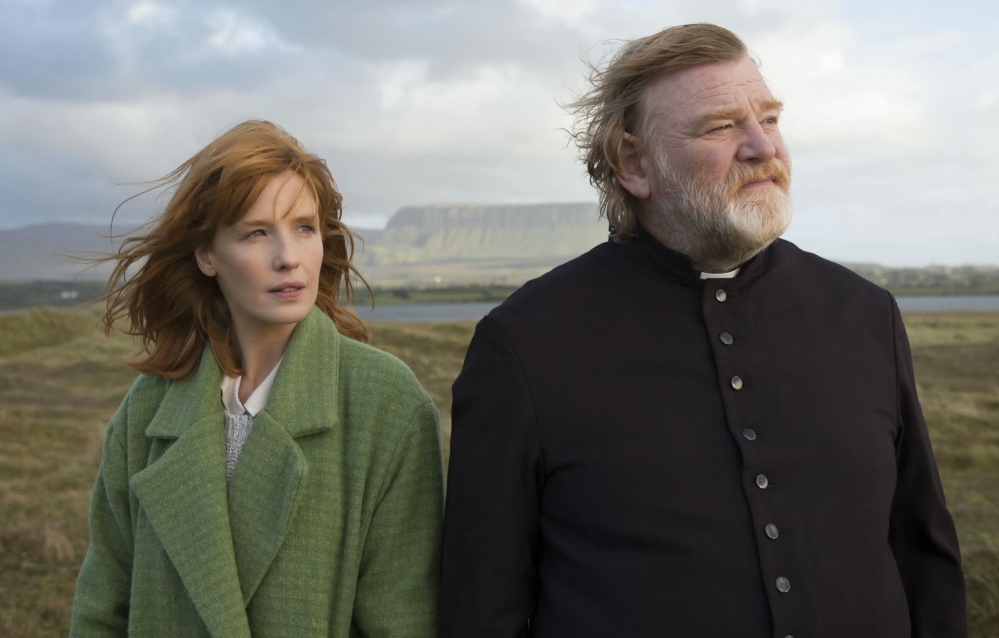“Hell is other people.”
Jean Paul Sartre.
In Jean-Paul Sartre’s 1944 play, “No Exit,” the writer posits the theory that Hell is not a flaming pit, but that Hell is, indeed, other people.
In “Calvary,” writer-director John Michael McDonagh appears to agree, by giving us not the fairy tale Irish of Hollywood, but a village of the damned, of tortured souls too wrecked even for Hell.
There are no leprechauns in McDonagh’s Ireland, no glistening shamrocks full of morning dew. There is no pot of gold at the end of the rainbow here, in fact, there is no rainbow, just the rain, the wind, lowering skies and eternally unhappy folk.
At opening, we are in the poor church of Father James Lavelle (Brendan Gleeson) as he is hearing a confession. Father and his confessor sit side by side in separate amber lighted cubicles, the confessor, masked by the wooden grill, announces his intention to murder the priest. He’s the aging victim of sexual abuse from a priest now dead, so he’s chosen this priest to die in the manner of Jesus, for the sins of that abusive priest. “No matter how innocent you are, we’ll meet on the beach,” he says, “and there, I’ll kill you, Sunday week, so set your house in order.”
Father James knows the voice. He knows the man, and even as he reports the incident to his cardinal, he won’t give up the name. At film’s end on the stormy edge of the sea, we will see the face of our would-be killer. And so this week, that the voice promises, begins, and the clock on the wall next to the face of Jesus ticks away the seven days.
Father James’ “house” is this tiny village in Ireland’s windswept County Sligo, a moonscape of hills and rocks and lost souls, condemned, it seems, to torture one another.
We meet Simon, (Isaach de Bankole) a cynical womanizing African expatriate mechanic, who is sleeping with the butcher’s unfaithful wife, Veronica Brennan (Orla O’Rourke). A young alcoholic, disillusioned tech millionaire (Dylan Moran) retired to his family estate, seeks redemption by offering the church a fortune. There is an aging and dying writer (M. Emmet Walsh) who begs the priest for a gun to end his ordeal, and a taunting atheist surgeon, Dr. Frank Harte, (Aidan Gillen) who could very really be Satan himself, shadows the priest, picking away at his spirit like a hungry crow.
All of these souls spend the dark nights and gray days in the local bar. There seems to be no joy here, but for Father James’ lovely daughter Fiona, (Kelly Reilly) who has come home from her exile in Dublin to try once again to connect with the father she feels abandoned her to follow the way of the cross, and leave her “an orphan.”
James, a widower who took the collar after his wife died, is a gentle man with a face like an angry fist, and a forgiving heart like Jesus, if that Nazarene had tasted Irish whiskey. The drink is a habit that James himself has moved away from, while still remembering the taste of it on his tongue, like the remembered kiss of a young lover.
We don’t know what Father James’ life was before his wife died, a judge, a professor maybe. We can see that he is an educated man who has returned to his God, but can’t convince his flock, poor and bewildered by modernity, of their savior’s mercy, or that in this pile of rocks, he even exists.
McDonagh’s film is anchored by the awesome weight of Brendan Gleeson’s magnificent gift. Gleeson, probably Ireland’s greatest actor, moves from one stunning performance to the next, and here he tops his role as the forlorn assassin in “In Bruge,” that was directed by McDonagh’s brother Martin.
Each of the actors blends perfectly, helping to hold together this dark and haunting tapestry.
Larry Smith’s camera walks the muddy streets and wind swept beaches and sits in the mahogany darkness of the pub like a ghost.
McDonagh knows his Ireland and its Irish people. He has long been a director of note, and here in this story, in this script, he becomes a poet.
J.P. Devine is a former stage and screen actor.
Send questions/comments to the editors.


